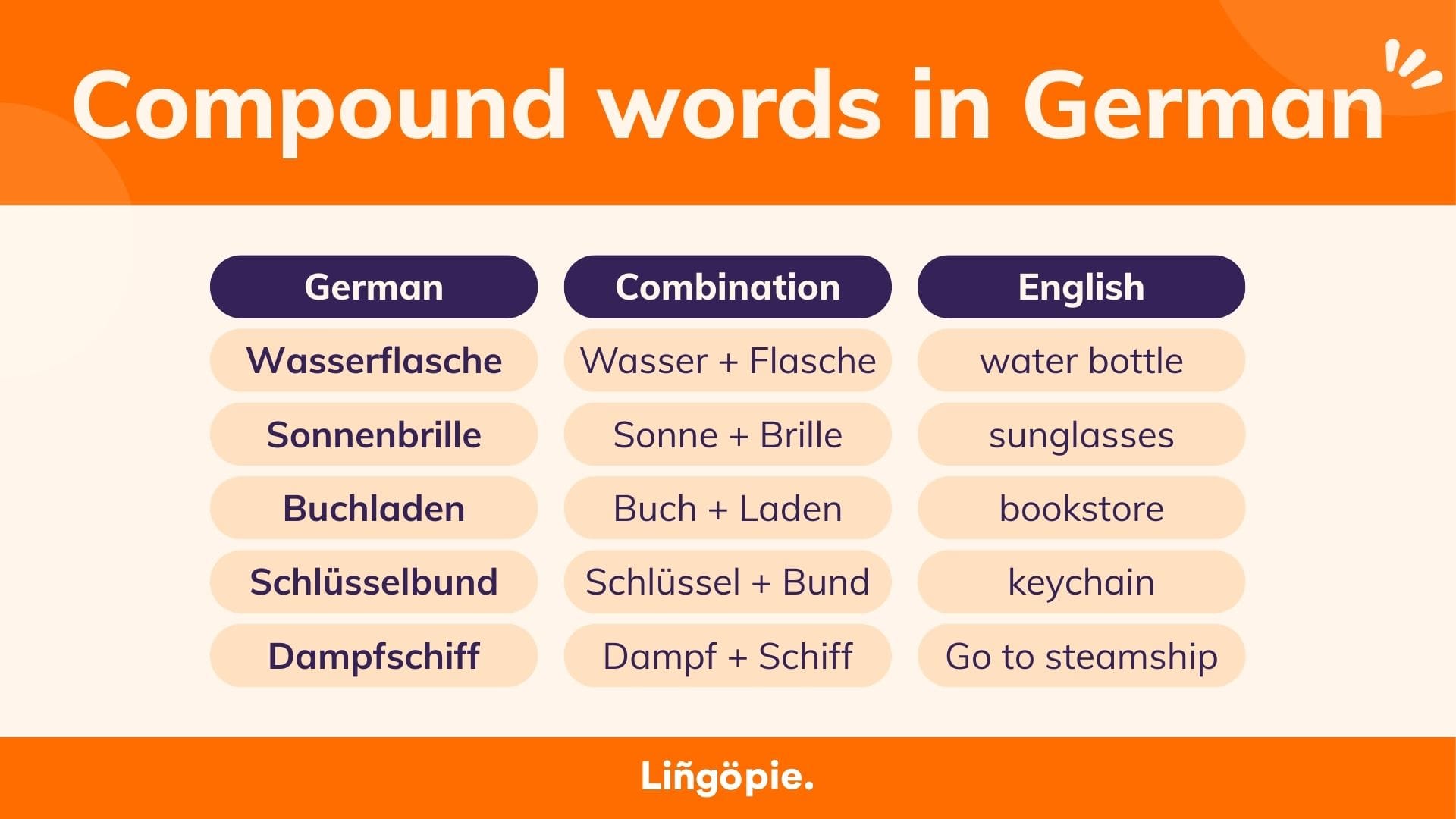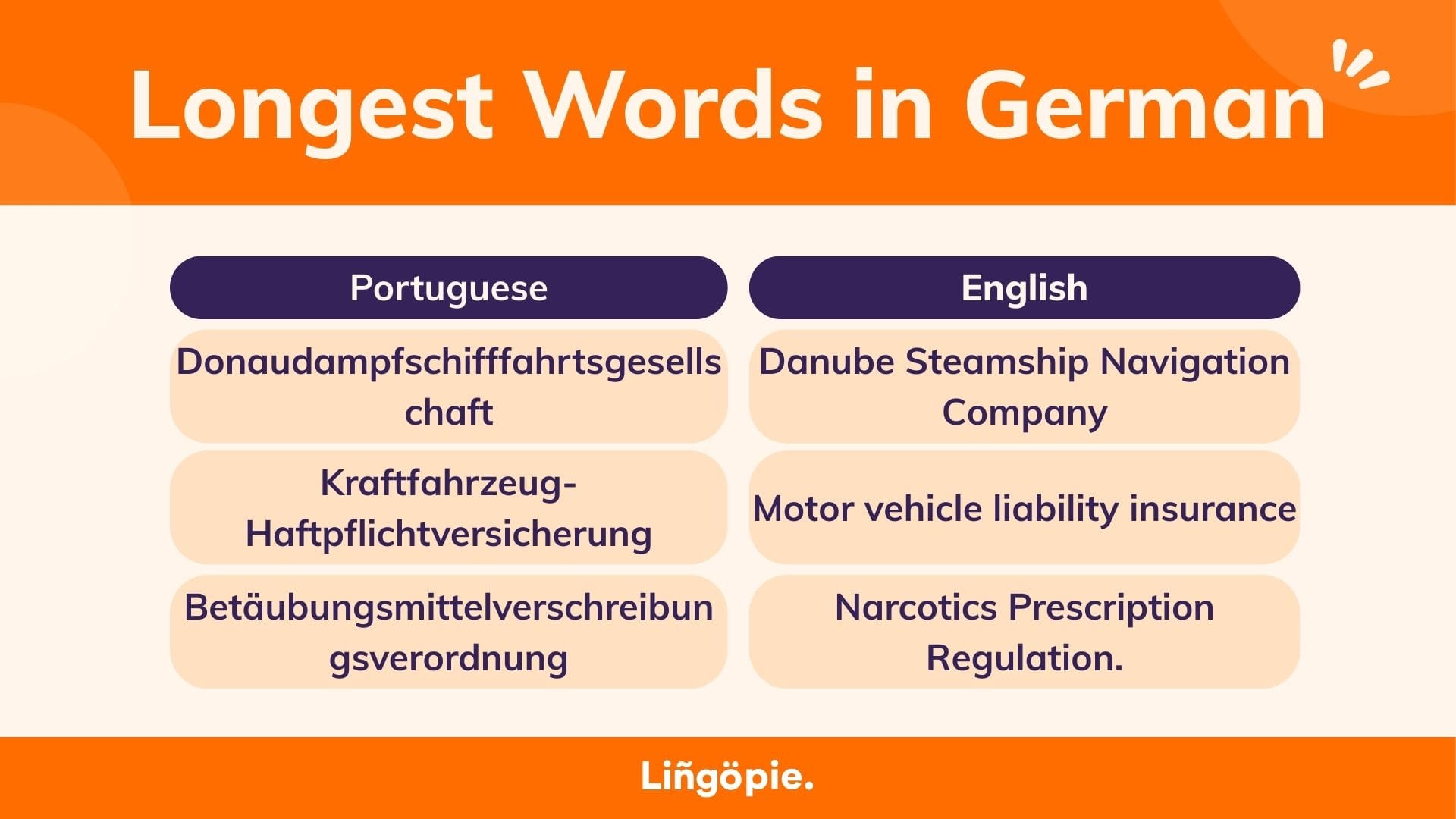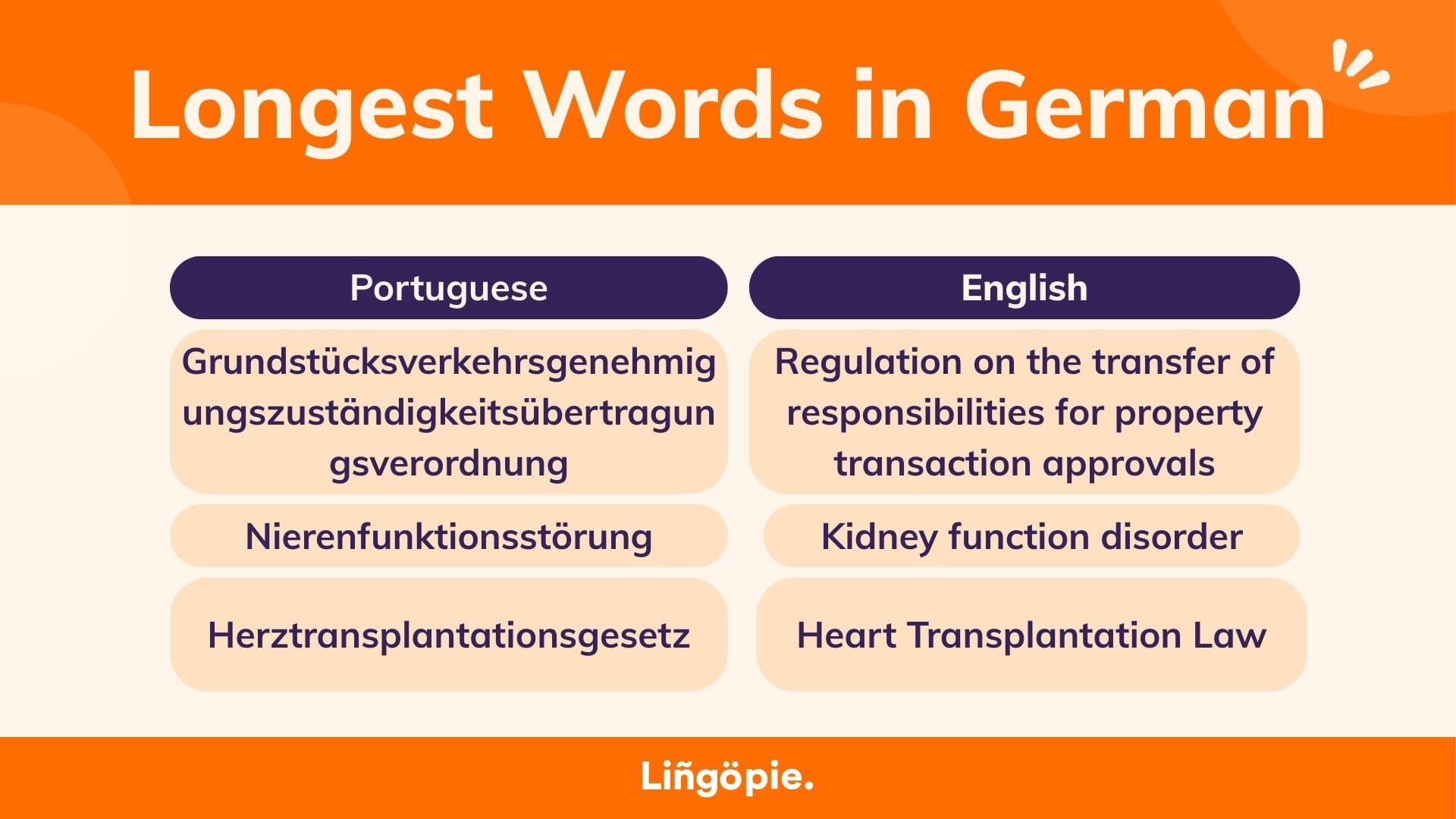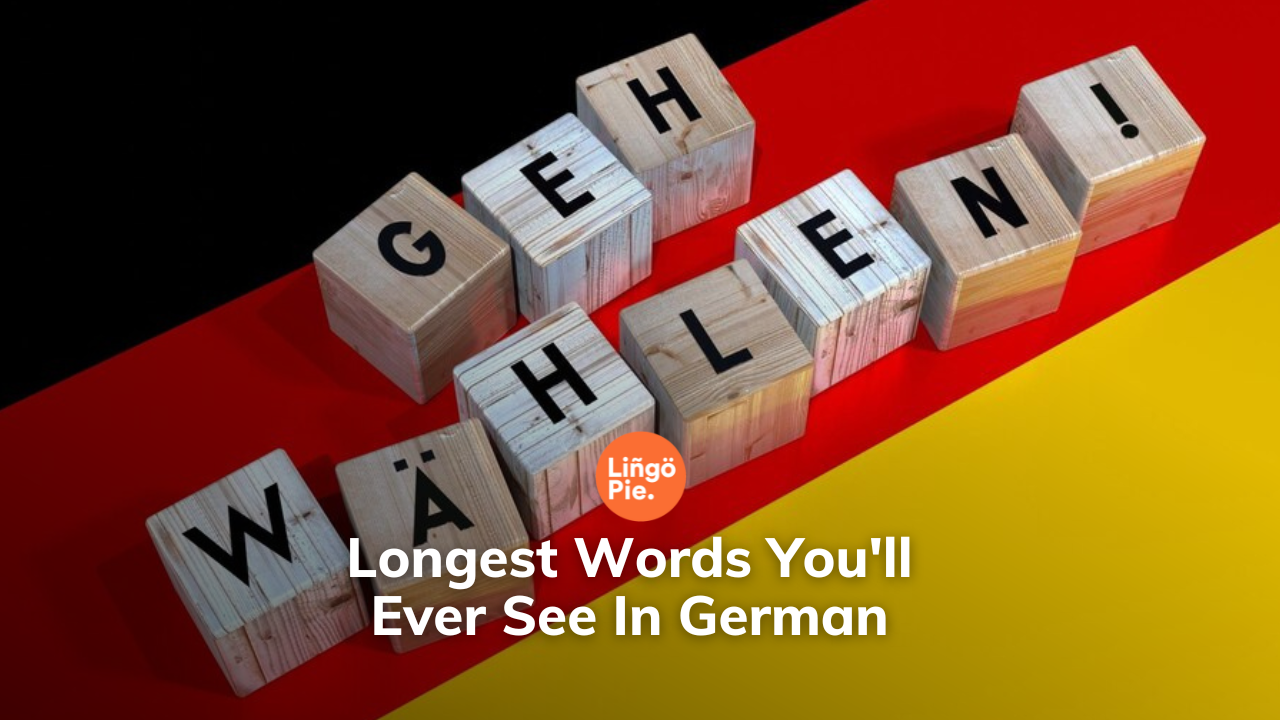German has a reputation for creating some of the longest word in the world candidates, and for good reason. The language loves to smash concepts together into impossibly long compound words that somehow make perfect sense to native speakers.
Don't believe me? Simply take "Rindfleischetikettierungsüberwachungsaufgabenübertragungsgesetz" as an example. It was a real legal term in Germany at one point, but it’s been officially retired. It's 63 letters of pure bureaucratic chaos, yet every syllable serves a purpose.
In this post, we’ll explore the longest words in German, learn their meanings, and understand the linguistic culture behind them. But first, let's understand the logic behind these long compound words in German!
- 15 German Jokes That'll Change How You See German People
- How To Order Beer In German: 6+ Easy Ways
- Swiss German And German Language: 5 Major Differences

Why Are German Words So Long?
German words are so long because the language builds new terms by combining existing words into one. This process is called compounding and it lets German create very specific meanings without adding new vocabulary or borrowing foreign words. Instead of using a phrase, German fuses it all into a single, extra-long word.
For example, the word: Donaudampfschifffahrtsgesellschaftskapitän
means “Danube steamship company captain.”
It may look intimidating, but it's really just several smaller words strung together:

- Donau (Danube)
- Dampf (steam)
- Schifffahrt (shipping)
- Gesellschaft (company)
- Kapitän (captain)
German uses this method all the time especially in technical, legal, or bureaucratic language. So while German isn’t agglutinative, its love of precision and word-building makes for some truly epic vocabulary.
Examples of Simple Compound Words In German
To illustrate how these compounds work, let's look at some simple examples:
Wasserflasche (Wasser + Flasche)
- Wasser means water.
- Flasche means bottle.
- Wasserflasche means water bottle.
Sonnenbrille (Sonne + Brille)
- Sonne means sun.
- Brille means glasses.
- Sonnenbrille means sunglasses.
Buchladen (Buch + Laden)
- Buch means book.
- Laden means store.
- Buchladen means bookstore.
Schlüsselbund (Schlüssel + Bund)
- Schlüssel means key.
- Bund means bunch.
- Schlüsselbund means keychain.
These examples demonstrate how German combines familiar words to create new terms that are often self-explanatory once you understand the components.,
How Context Matters in Understanding Compound Words
While many compound words are easy to decipher with a basic understanding of their components, context plays a crucial role in determining their precise meaning. This is because some compounds can have multiple interpretations depending on how the individual words interact in different contexts.
For example:
- Dampfschiff (Dampf + Schiff)
- Dampf means steam.
- Schiff means ship.
- Dampfschiff translates to "steamship."
However, a more complex word like Donaudampfschifffahrtsgesellschaft (Donau + Dampf + Schiff + Fahrts + Gesellschaft) requires understanding each part:
- Donau means Danube (a river).
- Dampf means steam.
- Schiff means ship.
- Fahrts means travel or journey.
- Gesellschaft means company or society.
- Donaudampfschifffahrtsgesellschaft means "Danube Steamship Navigation Company."
In this case, without context, it would be challenging to piece together the full meaning accurately.
Additionally, some compound words might appear intimidatingly long but can be broken down into smaller, more familiar parts. Understanding the context in which they are used helps clarify their meaning and makes them less daunting. For German learners, practice and exposure to these compounds in various contexts enhance comprehension and fluency.
What Is The Longest Word In The German Language?
The longest word officially recorded in the German language was "Rindfleischetikettierungsüberwachungsaufgabenübertragungsgesetz." This formidable term, with 63 letters, translates to "Beef Labeling Supervision Duties Delegation Law." It referred to a law concerning the delegation of tasks related to the supervision of beef labeling.
However, the law was repealed in 2013, so the word is no longer in official use. Still, it remains the longest documented German word to appear in a legal or bureaucratic context.

So, What’s the Longest Word in German That's Used Today?
There’s no clear winner, since German words can technically be built on the spot. But some long words still appear in technical fields. Examples include:
- Donaudampfschifffahrtsgesellschaftskapitän
(“Danube steamship company captain”) - Kraftfahrzeug-Haftpflichtversicherung
(“motor vehicle liability insurance”)
These words are long, but unlike the beef-labeling monster, they’re still in use in formal writing or legal documents.
Famous Long German Words
While not all of these are used in everyday conversation, these famous long German words can still be helpful when you're learning the language on your own. Many are built in a logical, step-by-step way so I’ve included word breakdowns to make them easier to understand.
Donaudampfschifffahrtsgesellschaftskapitän
- Donau: Danube (a river)
- Dampf: steam
- Schiff: ship
- Fahrt: travel or journey
- Gesellschaft: company or society
- Kapitän: captain
This word means "Danube Steamship Company Captain." It refers to the captain of a steamship belonging to a company that operates on the Danube River. Each component builds on the previous to specify the role and context of the captain within the company.
Kraftfahrzeug-Haftpflichtversicherung
- Kraftfahrzeug: motor vehicle
- Kraft: power
- Fahrzeug: vehicle
- Haftpflicht: liability
- Haft: custody or liability
- Pflicht: duty or obligation
- Versicherung: insurance
This word translates to "Motor Vehicle Liability Insurance." It refers to the mandatory insurance that covers the liability of motor vehicle owners in case of accidents or damages. The term is commonly used in the context of automobile insurance policies in Germany.
Betäubungsmittelverschreibungsverordnung
- Betäubungsmittel: narcotics
- Betäubung: anesthesia or numbing
- Mittel: means or agent
- Verschreibung: prescription
- Verschreiben: to prescribe
- Verordnung: regulation
This word means "Narcotics Prescription Regulation." It refers to the regulations governing the prescription of narcotic drugs. This term is used in medical and pharmaceutical contexts to describe the legal framework for prescribing controlled substances.

Long German Words in Everyday Use
German's ability to form compound words is particularly useful in specialized fields such as law, medicine, and technology. Here are examples of long words commonly used in various contexts:
Grundstücksverkehrsgenehmigungszuständigkeitsübertragungsverordnung
- Grundstücksverkehr: property traffic (real estate transactions)
- Genehmigung: approval
- Zuständigkeit: responsibility
- Übertragung: transfer
- Verordnung: regulation
Regulation on the transfer of responsibilities for property transaction approvals. This type of word is used in legal documents to precisely define regulatory procedures.
Nierenfunktionsstörung
- Niere: kidney
- Funktions: function
- Störung: disorder
Kidney function disorder. This term is used in medical diagnoses and documentation to describe a specific type of kidney problem.
Herztransplantationsgesetz
- Herz: heart
- Transplantation: transplantation
- Gesetz: law
Heart Transplantation Law. This word is used to refer to legislation governing heart transplant procedures.
Datenverarbeitungsüberwachungsaufgaben
- Datenverarbeitung: data processing
- Überwachung: monitoring
- Aufgaben: tasks
Data processing monitoring tasks. This term is used in IT and data management to describe tasks related to overseeing data processing activities.
Elektroinstallationsarbeiten
- Elektroinstallation: electrical installation
- Arbeiten: works or tasks
Electrical installation works. This word is common in the field of construction and engineering, referring to tasks involved in setting up electrical systems.
How to Pronounce Long German Words
Don't let these monsters intimidate you! German pronunciation follows consistent rules, making even the longest words manageable once you break them down.
Syllable by Syllable
German compound words are pronounced exactly like their individual parts. Take Donaudampfschifffahrtsgesellschaftskapitän:
- DO-nau (DOH-now)
- DAMPF (dahmpf)
- SCHIFF (shiff)
- FAHRTS (fahrts)
- ge-SELL-schaft (geh-ZELL-shahft)
- ka-pi-TÄN (kah-pee-TAHN)
Stress Patterns
When saying German words, remember that the main stress usually falls on the first part of the compound, with secondary stress on other root words.
Common Sounds:
- sch = "sh" sound
- tion = "tsee-ohn"
- ei = "eye" sound
- eu = "oy" sound
- ü = round your lips and say "ee"
Say each component word separately first, then gradually speed up until they flow together naturally.
Tips for Remembering German Compound Words
Learning long German words doesn't have to be a nightmare. Here are proven strategies that actually work:
1. The Building Block Method
Start with the base components and work outward:
- Learn Schiff (ship) first
- Add Dampf (steam) = Dampfschiff (steamship)
- Add Fahrt (journey) = Dampfschifffahrt (steamship travel)
- Keep building from there
2. Visual Storytelling
Create mental images for each component:
- Wasserflasche (water bottle): Picture water pouring into a bottle
- Sonnenbrille (sunglasses): Imagine the sun reflecting off glasses
3. Root Word Families
Learn common roots that appear everywhere:
- Versicherung (insurance) appears in tons of compound words
- Gesellschaft (company/society) shows up constantly
- Verordnung (regulation) is everywhere in legal terms
4. The Acronym Trick
For super long words, create acronyms from the first letters: Rindfleischetikettierungsüberwachungsaufgabenübertragungsgesetz = R.E.Ü.A.G.
5. Chunk and Conquer
Break intimidating words into 2-3 manageable chunks instead of trying to memorize the whole thing at once.
Final Words
Long German words, like "Rindfleischetikettierungsüberwachungsaufgabenübertragungsgesetz" and "Kraftfahrzeug-Haftpflichtversicherung," are fascinating examples of the language's precision and adaptability. These words, often found in specialized contexts, encapsulate complex ideas within a single term.
Learning these compounds can enhance language skills and cultural understanding. Start with simpler words and work your way up to more complex words. Enjoy the journey and discover the beauty of the German language, one compound word at a time.
Learn German With Lingopie
Inspired by these German words? Explore the German language and culture further with Lingopie. Start your journey today and immerse yourself in engaging German movies with interactive subtitles. With Lingopie, learning German has never been more fun and effective. Sign up now and begin your adventure with Lingopie!
Download Lingopie from the App Store or Play Store now and get a FREE 7-day trial!
Frequently Asked Questions
1. What German word has 79 letters?
The German word with 79 letters is often cited as "Donaudampfschifffahrtselektrizitätenhauptbetriebswerkbauunterbeamtengesellschaft." This tongue-twister translates to "Association for Subordinate Officials of the Head Office Management of the Danube Steamboat Electrical Services."
2. What is the 190000 letter word?
This is a myth. No language has a 190,000-letter word that's practically usable. While German can theoretically create infinitely long compounds, there are practical limits to what humans can process and remember.
3. What is the hardest German word?
Determining the "hardest" German word is subjective and can depend on various factors such as pronunciation difficulty, complexity of meaning, or unfamiliarity to non-native speakers. However, some candidates often cited for being challenging include words like "Eichhörnchen" (squirrel) due to its pronunciation, or technical terms like "Lebensversicherungsgesellschaft" (life insurance company) due to its length and complexity.







![7 Best Apps To Learn German On Your Own [REVIEWED]](/blog/content/images/size/w300/2026/01/best-apps-to-learn-german-on-your-own.png)
![6 Best German Translator Apps For Beginners [TESTED]](/blog/content/images/size/w300/2026/01/Best-german-translation-apps-for-beginners-.jpeg)
